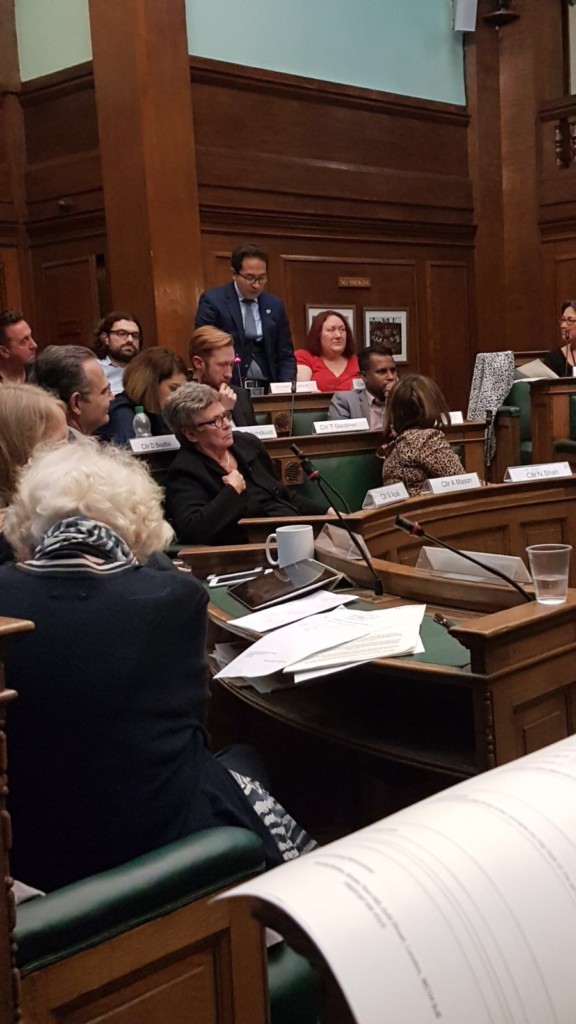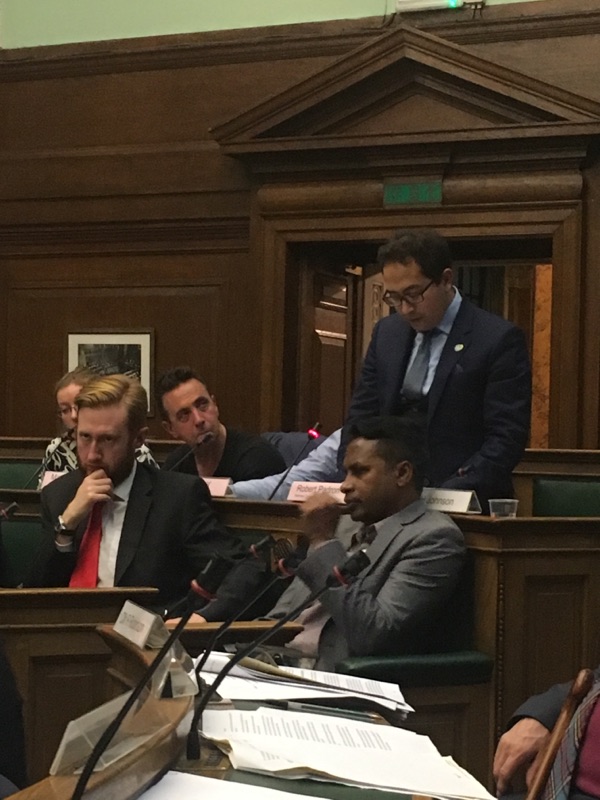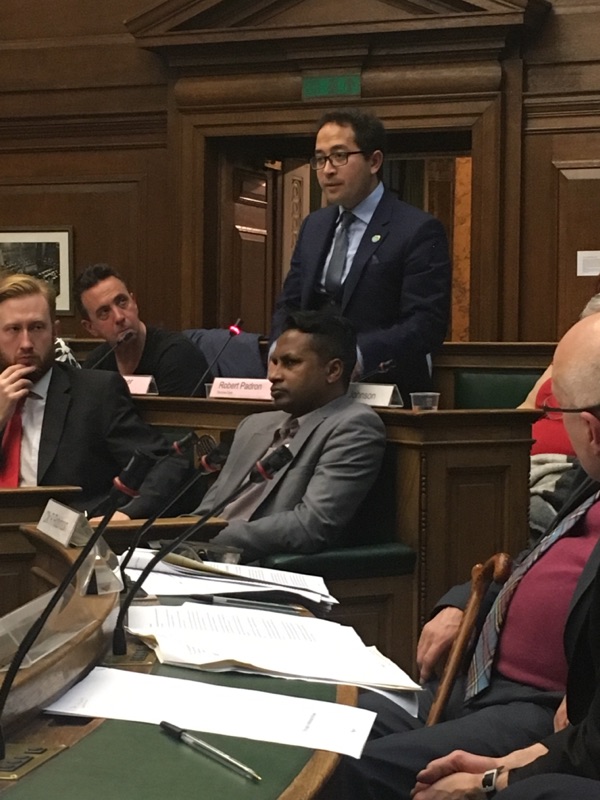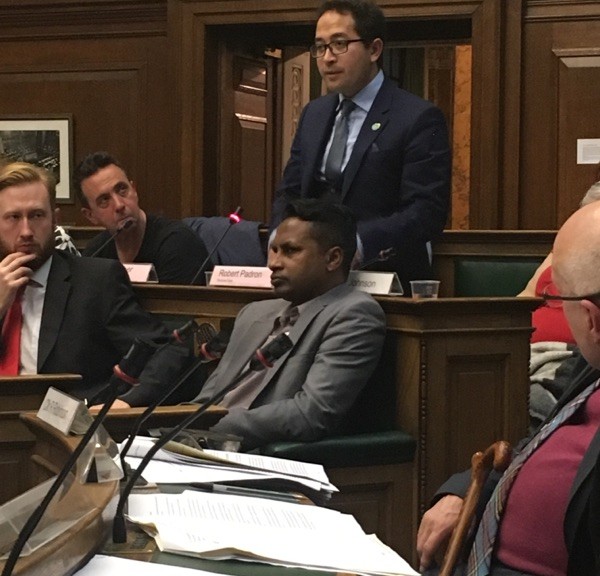Belsize Village, London, UK: Yesterday on the night of October 23, 2017, Penrose Care’s managing director Robert Stephenson-Padron spoke to a meeting of Camden Council at Camden Town Hall on Judd Street about the impacts of Brexit on home care.
The extraordinary meeting which invited various speakers from across the Borough was organised by the Camden Council Brexit Working Group led by Cllr. Lazzaro Pietragnoli.
A copy of of Mr. Stephenson-Padron’s prepared remarks are beneath the contact information of this press release.
ENDS
Media Contact
Penrose Care
Robert Stephenson-Padron
robert.padron@penrosecare.co.uk
0207 435 2644
About Penrose Care
Penrose Care is an ethical provider of home care services London, United Kingdom to adults with disabilities and elderly persons, including those with dementia. The company operates upon a fundamental belief that to promote a caring workforce, the organisation itself must be caring. As the pioneer of ethics in home care in the UK, Penrose Care in 2012 became one of the first four providers in the country to become an Accredited Living Wage Employer and in 2013 the first independent sector provider to be compliant with Citizens UK’s landmark Social Care Charter. Penrose Care was named the Living Wage Champion for the London region in 2016 by the Living Wage Foundation.
Penrose Care’s ethical approach promotes higher quality social care workers and low staff turnover which in turn results in excellent care. Penrose Care is headquartered in Belsize Village, north London and was founded by Robert Stephenson-Padron, a healthcare research analyst, and Dr. Matthew Knight, a hospital physician.
Robert Stephenson-Padron’s prepared remarks for Camden Council’s extraordinary meeting on Brexit held on October 23, 2017:
Mr. Mayor and councillors, thank you for inviting me to speak to you tonight about the European Union and Brexit. I would like to say a special hello and thank you to Councillor Lazaro, who was actually the person who swore me in as a British citizen in 2014 in this chamber three years ago.
Indeed, I speak to you as an immigrant and on behalf of Penrose Care, an ethical home care provider based in Belsize Village which largely consist of immigrants. 80% of our staff are EU nationals.
As such, the rhetoric and uncertainty running up to and post last summer’s EU referendum has put undue stress on my colleagues and has presented Penrose Care and the entire social care sector with a variety of significant challenges which further imperil an already fragile sector.
Before I speak to those challenges I want to make clear the monumental importance the European Union has had on my life and indeed, the life of Penrose Care.
First, would I have moved here to the UK if it had not been a member of the EU in 2007. Probably not.
Further, if you asked me today, do I think we would have established Penrose Care in 2012 if the UK was not a member of the European Union? I would say, probably not, particularly since our first workers were all EU nationals.
And therefore along with looking at the specific impacts of Brexit on social care, the Council should consider the long-term impacts of Brexit on entrepreneurship, capital formation, and SME-led job creation.
Now looking at social care, as you know, it is important to recognise that it is a sector whose crises preceded the Brexit vote but have been worsened by the Brexit vote. These include:
1) A worsening in the social care recruitment crisis. The long-term recruitment crisis in social care shifted to a catastrophe after the Brexit vote, with EU nationals here less keen to move jobs and new EU nationals being deterred from moving here.[1]
2) And this has led to a worsening in the delayed transfer of care crisis. This has been the most catastrophic crisis worsened by the Brexit vote with English delayed transfers of care beds due to social care delays increasing by 38%[2] last winter year-on-year with patients being unable to secure social care amid a recruitment crisis worsened by Brexit.
3) The nursing shortage crisis. We have 24,000 nursing vacancies and nursing registrations from the EU have fallen by 96%.[3],[4] This worsens the quality of services district and community nursing can provide, negatively impacting our collaborations with them.
4) The social care financial crisis. One in four home care providers are at risk of insolvency according to BBC Panorama in March.[5] This crisis is exacerbated if care providers cannot maintain staffing levels and cannot grow if they cannot increase their staffing levels.
I would be happy to elaborate on these challenges to you in the Q&A but I would close by saying that of course the UK has every right to leave the EU. But I think none of us have the right to sit idly by while this reckless Brexit process inhibits our ability to support the most frail in our society in safe and dignified ways.
Thank you.
[1] “Social care system ‘beginning to collapse’ as 900 carers quit every day” (BBC News: 11 April 2017), available http://www.bbc.co.uk/news/uk-england-39507859
[2] Delayed Transfers of Care Data 2017-18 (NHS England, 12 Oct 2017), available https://www.england.nhs.uk/statistics/statistical-work-areas/delayed-transfers-of-care/delayed-transfers-of-care-data-2017-18/
[3] “NHS faces shortage of more than 40,000 nurses after Brexit, says leaked government prediction” (Independent: 7 April 2017), available http://www.independent.co.uk/news/health/nhs-nurse-shortage-40000-post-brexit-trusts-hospitals-uk-healthcare-leaked-government-a7671791.html
[4] “96% drop in EU nurses registering to work in Britain since Brexit vote” (The Guardian: 12 June 2017)
[5] “’Lack of money’ prompts care firms to end council contracts” (BBC News: 20 March 2017), available http://www.bbc.co.uk/news/uk-39321579

Penrose Care managing director Robert Stephenson-Padron speaks at Camden Council about Brexit. Photo 3

Penrose Care managing director Robert Stephenson-Padron speaks at Camden Council about Brexit. Photo 4

Penrose Care managing director Robert Stephenson-Padron speaks at Camden Council about Brexit. Photo 5

Penrose Care managing director Robert Stephenson-Padron at Camden Council – praised by a colleague on Instagram.







